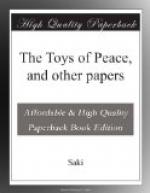The train which carried Alethia towards her destination was a local one, with the wayside station habit strongly developed. At most of the stations no one seemed to want to get into the train or to leave it, but at one there were several market folk on the platform, and two men, of the farmer or small cattle-dealer class, entered Alethia’s carriage. Apparently they had just foregathered, after a day’s business, and their conversation consisted of a rapid exchange of short friendly inquiries as to health, family, stock, and so forth, and some grumbling remarks on the weather. Suddenly, however, their talk took a dramatically interesting turn, and Alethia listened with wide-eyed attention.
“What do you think of Mister Robert Bludward, eh?”
There was a certain scornful ring in his question.
“Robert Bludward? An out-an’-out rotter, that’s what he is. Ought to be ashamed to look any decent man in the face. Send him to Parliament to represent us—not much! He’d rob a poor man of his last shilling, he would.”
“Ah, that he would. Tells a pack of lies to get our votes, that’s all that he’s after, damn him. Did you see the way the Argus showed him up this week? Properly exposed him, hip and thigh, I tell you.”
And so on they ran, in their withering indictment. There could be no doubt that it was Alethia’s cousin and prospective host to whom they were referring; the allusion to a Parliamentary candidature settled that. What could Robert Bludward have done, what manner of man could he be, that people should speak of him with such obvious reprobation?




